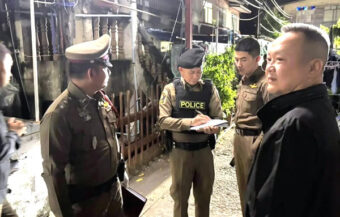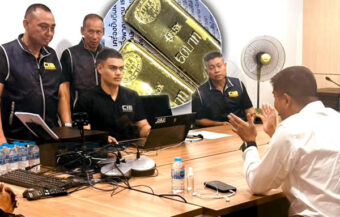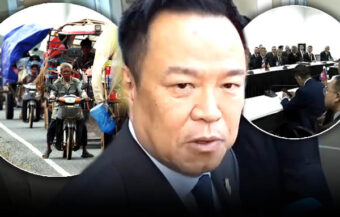Highway Patrol uncovers unlicensed Chinese-owned factories smuggling hazardous materials, fueling fears of Thailand becoming a dumping ground for toxic waste since China’s 2017 ban on such activities. Authorities struggle to control the growing threat.
A random Highway Patrol police stop on Sunday led to the discovery of two unlicensed Chinese-owned factories. The facilities in Nakhon Pathom and Samut Sakhon were engaged in aluminium smelting and recycling, activities unknown to Thai authorities. In addition, the discovery comes months after large quantities of toxic cadmium waste were found across provinces adjacent to Bangkok and the Eastern region. The situation highlights government inertia in dealing with broad concerns raised by environmentalists that Thailand, since 2017 and a law change in China, is being used as a dumping ground for toxic industrial activities that were banned that year in the Communist country.

Thailand is being used as both a dumping and recycling centre by Chinese-owned firms that have moved to the kingdom in large numbers since 2017. That was the year China outlawed the industry due to the threat posed by hazardous substances.
On Sunday, August 11th, a Nakhon Pathom Highway Patrol stop brought the problem back into focus. Officers stopped a trailer truck laden with large bags.
In brief, it was travelling from a factory in Nakhon Pathom to an aluminium smelting facility in Samut Sakhon.
Truck carrying undocumented hazardous material raises deep concerns about illegal recycling operations
Firstly, the truck’s cargo had no documentation. At length, the driver was cooperative with the patrol officers.
He admitted picking up the bags from the Phoem Phoon Sap factory near the centre of Nakhon Pathom. His destination was the Tai Bao Aluminum factory in Samut Sakhon.
Following this, the Natural Resources and Environmental Crime Suppression Division police were called in. Afterwards, they raided both factories.
In Phrong Madua, they discovered 8,258 bags with a weight of 12,387 tons of aluminium dross. In short, they were located in two warehouses of the Phoem Phoon Sap facility. Altogether, 14,514 tons were seized.
Afterwards, the aluminium factory in Samut Sakhon was raided.
Certainly, here too, another large quantity of the same substance was found. Later, police confirmed 2,100 tons in 1,400 bags.
Massive haul of highly toxic aluminium dross found in raids on two unlicensed factories in two provinces
Before entering the facility, commanding officers spoke with Ms. Ying, identified as a director. She told officers she was not available to meet them. However, she had no objection to the factory being searched.
Aluminium dross is a hazardous substance. For instance, it can seep into the soil and water sources. The substance has a very high concentration of metal. In addition, it can also be hazardous when exposed to air flows.
This week’s discovery comes after a series of raids in April where large concentrations of cadmium waste were found. These included plants at Rayong, Chonburi, Samut Sakhon, Samut Prakan and Bangkok. In short, it was a network of waste disposal and recycling operations.
Afterwards, two Chinese businessmen were charged in relation to factories in Samut Sakhon and Samut Prakan.
Environmental threat grows as illegal waste disposal networks linked to dangerous metals expand since 2017
Previously, the government announced a complete probe of these activities. However, these would only be confined to licensed factories.
There are fears that Thailand is becoming a target for this industry, which has in recent years been expelled from China.
Lethal Cadmium linked to a shift in dangerous waste recycling from China to Thailand since 2017
Certainly, police this week are reporting the two factories in question are unlicensed. Further, the police have confirmed that both are Chinese-owned. Thai employees are used for labour and interpreting services.
Certainly, these operations are using the cover of the Thai government’s Bio-Circular-Green (BCG) policy to establish recycling-linked enterprises. Indeed, this coincides with the decision by China to ban such activities in 2017.
Environmental campaigners have been calling for a deeper probe into what is happening. However, it appears authorities are only reacting on a case-by-case basis.
Rising suspicion of Thailand’s role as a hub for unlicensed and dangerous waste recycling operations
After that, the volume of imported waste substances entering Thailand has skyrocketed. For example, in 2017, Thailand imported 2,824 metric tons of e-waste. Significantly, in the first 10 months of 2023 alone, the figure was 58,877 metric tons.
Certainly, at the same time, a large majority of such firms are Chinese-owned. Indeed, many of the factory owners are remote and do not live in Thailand.
Significantly, up to 2,600 such firms have been licenced for recycling activties.
Nonetheless, according to environmental activists, the licenced activity is often at odds what how the factories operate. In addition, it is thought the corruption exists protecting the operations from local police and officials.
This week’s discovery now raises the question of unlicensed Chinese-owned firms.
Join the Thai News forum, follow Thai Examiner on Facebook here
Receive all our stories as they come out on Telegram here
Follow Thai Examiner here
Further reading:
Lethal Cadmium linked to a shift in dangerous e-waste recycling from China to Thailand since 2017
Threat from contaminated fruit and vegetables from China part of a wider problem facing the kingdom
Bank of Thailand holding strong against quite a strident push by the PM for more populist economics
Digital Wallet plan blown out of the water by corruption body on Tuesday warning of illegality
Economy is in troubled waters with fears for both exports and foreign tourism as 2023 winds down
Thailand faces an economic future of low growth despite Srettha’s plans because of a darker world
Another dip for the baht or are economic danger signals flashing for both Thailand and the world?
Bank of Thailand boss appears critical of the new government’s policy initiatives on the economy
Concerns over household debt rising as banks report marginally lower non-performing loans
Thailand preparing for a soft landing as ‘cracks’ open up in the Chinese economy says bank chief


















